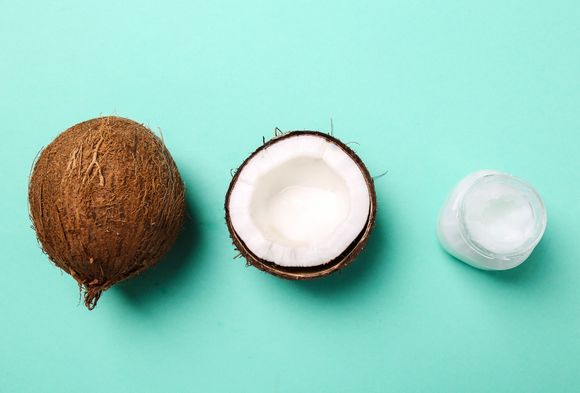Essence of coconut oil
Coconut oil (Cocos Nucifera) is a type of tropical oil obtained from the fleshy part of coconuts. Both unprocessed and refined coconut oil can be found commercially. Therefore, you should always read the information on the label and know which type you are buying from, as their benefits differ by this criterion.
Coconut oil can be produced globally, but the largest producers are the Philippines, Indonesia, India, Sri Lanka, Malaysia and Papua New Guinea.
Unprocessed coconut oil is less processed than the refined version and this retains a sweet and fresh tropical taste. Refined coconut oil, on the other hand, goes through more processing, which leads to a more neutral smell and taste. Therefore, refined oil is suitable to use as the main cooking oil in various recipes. Such you will find a little later in the article.
There is also a third type of coconut oil according to the method of preparation - partially hydrogenated. It is further processed and transforms some of the unsaturated fats (good fats) into trans fats (unhealthy fats).
Composition of coconut oil
Coconut oil has an interesting and complex background in terms of its nutritional composition. Even his most sworn supporters can't deny the high content of saturated fat (estimated at 83 percent), but that's the chemical composition we need to pay attention to.
Saturated fats in coconut oil are made up of medium-chain triglycerides (MCTs), which are metabolised differently in the body compared to long-chain triglycerides (LCT). The latter are contained in saturated fats of other oils and animal products.
Coconut oil is extracted from coconut meat, which is devoid of fiber, carbohydrates and proteins and remains pure fat. As we know, there are many different types of fat. The two main types are:
- saturated fats (unhealthy fats that are associated with a rise in blood cholesterol)
- unsaturated fats (healthy fats that may reduce the risk of heart disease).
Saturated fats make up 83% of coconut oil – a higher percentage of cow's butter, for example. Saturated fats have been found to be able to increase ldl cholesterol levels in the blood and should be consumed moderately to limit the risk of developing cardiovascular disease.
The evidence suggests that coconut oil is especially rich in a type of saturated fatty acid called "lauric acid". This type of fatty acid has the ability to mimic healthy unsaturated fats by raising HDL cholesterol. This can make it a potentially less harmful species than other saturated fats.
However, studies have shown that with the consumption of coconut oil, while healthy HDL cholesterol levels seem to be rising, total cholesterol and unhealthy LDL cholesterol in the blood can also increase. Therefore, coconut oil is recommended for use, but not as the main cooking oil, but rather as secondary in some cases and in limited quantities. However, as a product for culinary and cosmetic purposes, coconut oil has its proven benefits and positive effects.
Do you remember those MCTs we mentioned at the beginning? They are composed of fatty acids called "medium-chain fatty acids," or MCFA, which have antimicrobial, antibacterial and antiviral properties. Coconut oil acquires these qualities when converting fatty acids into the body and thus manages to realize its health benefits.
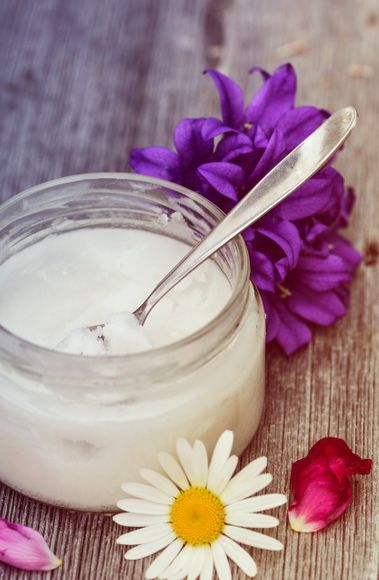
Benefits of Coconut Oil
Coconut oil and obesity
In a randomized, double-blind, clinical study examined the effects of taking a dietary supplement with coconut oil on the biochemical and anthropometric profiles of obese women. [ref.2] The results showed that there was a decrease in body mass index in both groups, as well as a decrease in waist circumference in one of the groups. Similar results are in another study, but this time in obese men. Coconut oil included in an energetic balanced diet can raise HDL cholesterol and reduce the TC/HDL cholesterol ratio in obese men. [ref.3]
Antioxidant action
The antioxidant properties of unprocessed coconut oil, obtained by cooling and fermentation, have been studied and compared with refined, bleached and deodorized coconut oil in the publication "Antioxidant capacity and phenolic acids of virgin coconut oil". The unprocessed oil contains the phenolic acids ferrous and p-cumacic acid, which are due to the antioxidant capacity of this type of coconut oil, which is significantly better than that of processed oil [ref.4] In mice, it was found that the intake of untreated coconut oil leads to higher levels of antioxidants in the brain, lower levels of cerebral 5-hydroxytryptamine and reduced load on the adrenal glands. In addition, levels of serum cholesterol, triglycerides, glucose and corticosterone are also lower, suggesting a potential area of beneficial action of the oil as an anti-stress agent. [ref.5] More studies on this are needed in both animals and humans.
Antiviral action
It is believed that the medium-chain fatty acids of coconut oil fight against lipid-coated viruses, such as influenza and Epstein-Barr. MCFA have the ability to destroy viral membranes, which interferes with their growth and maturation.
An August 2021 study showed that unprocessed coconut oil is effective in lowering C-reactive protein levels among suspected and probable cases of COVID-19. [ref.6] A twenty-eight-day randomized, double-blind, controlled intervention was conducted among 63 participants at two isolation facilities in the city of Santa Rosa, Laguna, Philippines. Participants were randomly assigned to receive either a standardized meal (control) or a standardized meal mixed with a predetermined dose of untreated coconut oil. Participants in the intervention group showed a significant decrease in the level of C-reactive protein, with the mean CRP level normalised to≤5 mg/dL on the 14th day of intake.
Another study from 2020 points us to three mechanisms by which lauric acid and monolaurin - components of coconut oil, realize antiviral activity, namely;
- Destruction of the viral membrane. The antiviral actions of lauric acid and monolaurin were first documented in 1979, and then in 1982.
- Inhibit late maturation in the replication cycle of the virus
- Prevent the binding of viral proteins to the host cell membrane. [ref.7, 8]
Lauric acid is a medium-chain fatty acid that makes up about 50% of coconut oil. Monolaurin is a metabolite that is produced naturally by the body's own enzymes when taking coconut oil (also available as a dietary supplement). Sodium lauryl sulfate, a common surfactant that is produced by lauric acid, has also been shown to have powerful antiviral properties. [ref.9]
Anti-inflammatory action
Anti-inflammatory, analgesic, and antipyretic activities of virgin coconut oil confirm the anti-inflammatory, analgesic and antipyretic effects of untreated coconut oil. [ref. 10] Anti-inflammatory action has also been established by suppressing inflammatory markers, as well as by increasing the function of the skin barrier in vitro. [ref.11]
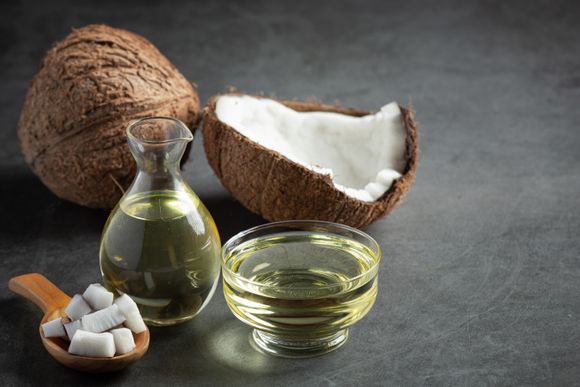
Photo created by jcomp from Freepik
Nephroprotective action
Supplementation with virgin coconut oil demonstrates nephroprotective activity by weakening the oxidative nephrotoxicity of methotrexate (a chemotherapeutic and immune-suppressing agent) by antioxidant and anti-inflammatory actions in the kidneys. The results suggest that untreated coconut oil may be beneficial for patients with MTX chemotherapy cancer against kidney damage. [ref.12] Unprocessed coconut oil has potential benefits in preventing nephrotoxic damage in rats caused by diclofenac (a non-steroidal anti-inflammatory medicine used to treat pain and inflammatory diseases). [ref. 13]
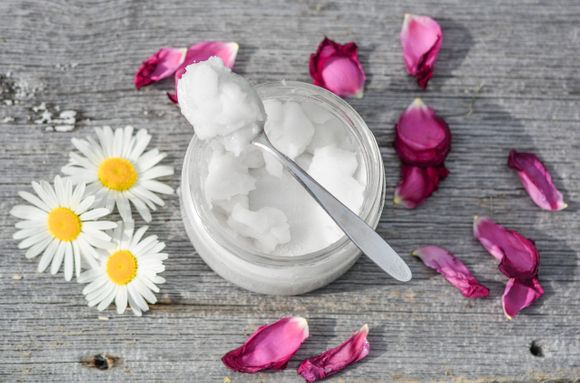
Coconut oil in Alzheimer's disease
In patients with Alzheimer's dementia who received 40 ml/day extra virgin coconut oil, a statistically significant increase in the MECWOLF test result was reported and therefore an improvement in cognitive status, especially in women, people without type II diabetes mellitus and patients in severe condition [ref.14] Many other factors are relevant for the positive influence of coconut oil on the cognitive status of patients with Alzheimer's disease, including the extent of memory problems, gender and other predisposing factors.
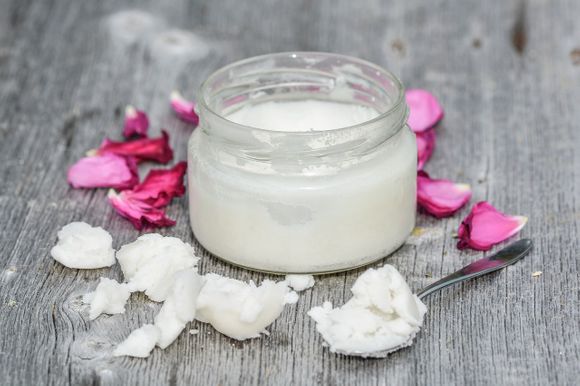
Antibacterial action
At certain concentrations, coconut oil "exhibits bactericidal activity" against E. coli [ref.15] and several other bacteria, including Staphylococcus aureus. Untreated coconut oil can inhibit the growth of S. aureus with destructive mechanisms aimed at bacterial cell walls and increase the ability of phagocytic immune cells. [ref.16]
There is evidence of innovative areas of application of antibacterial and softening effects of coconut oil in adults with atopic dermatitis. [ref.17] Traditionally oils such as olive oil and coconut are used to moisturize and treat skin infections, and in this study untreated coconut oil and virgin olive oil were compared.
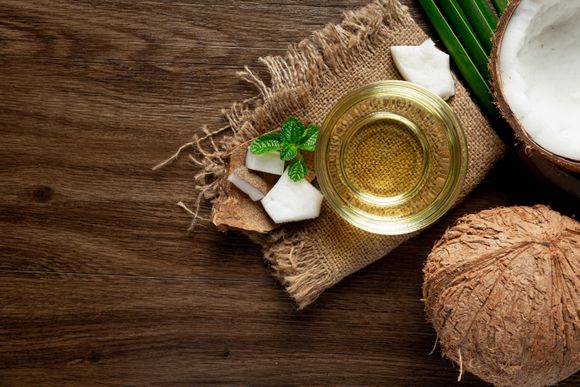
How to use coconut oil for cooking
Coconut oil is a suitable choice for sautéing, roasting and even frying (depending on the degree). Note, however, that one tablespoon of coconut oil contains about six times more saturated fat than olive oil.
You can include coconut oil in your diet, but you should use mainly unsaturated fats that have a significantly greater number of health benefits. You can use coconut oil for french fries, for frying eggs or for popping popcorn - just be sure to use virgin or refined according to your taste preferences.
Coconut oil is also extremely suitable for vegetarian, vegan or keto regime, as well as for preparing keto/vegan desserts. Replace the coconut oil with other fats in a ratio of 1:1. And another valuable tip: unless you're making a pie crust, use ingredients at room temperature when cooking with coconut oil. Since coconut oil hardens when it is below 24 degrees Celsius, combining it with cold ingredients can lead to the same effect.

Image by Huyền Lương Ngọc from Pixabay
How to use coconut oil for cosmetic purposes
- Moisturizer for the skin - a study on humans reveals that coconut oil increases hydration and reduces inflammation in the skin.
- A remedy for makeup - apply a little coconut oil on the eyelids with a cotton wool to remove the durable mascara.
- Lip balm - softens and hydrates lips in no time. It also tastes good.
- Eczema - the anti-inflammatory properties of coconut oil can soothe the exacerbation of eczema.
- Bath oil - add the aromatic oil to a warm bath to further improve the hydration and nourishment of the skin.
- Body scrub - combine 1/2 cup slightly melted or at room temperature coconut oil and 1/2 cup of coffee grounds. Pour into a small container. Freeze and then refrigerate between body cleaning procedures.
- Hair mask - for deep nourishment of the hair and protection against breakage, apply a few tablespoons of coconut oil on your hair and cover with a shower cap. You can leave the oil for a few hours or while you sleep.
- Taming skinning hair - for lush hair and anti-entanglement, add a little coconut oil to the ends of your hair and dry.
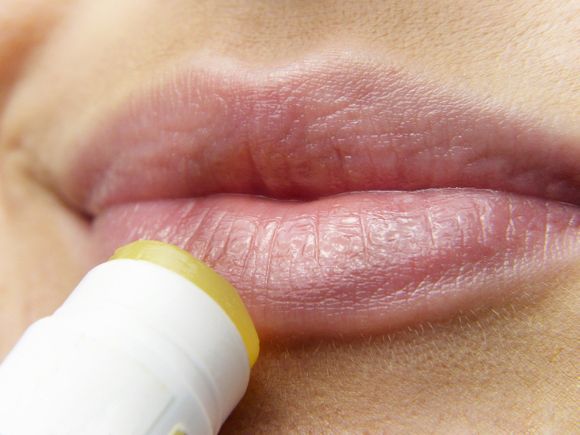
Recipes with coconut oil
Coconut oil biscuits
Ingredients:
- 2 cups universal flour
- 1 tablespoon baking powder
- 1 teaspoon sugar
- 1/2 teaspoon fine sea salt
- 1/2 cup hard refined coconut oil
- 3/4 cup canned low-fat coconut milk
Instructions:
Preheat the oven to 220°C. Put paper in a baking tray. Beat the flour, baking powder, sugar and salt in a large bowl. Blend the coconut oil until the mixture resembles large crumbs. Stir in the coconut milk until the dough is formed. Pat together and flatten on a lightly floured work surface next to a rectangle about 1 cm thick. Cut into 12 squares and arrange on the prepared baking tray, about 4-5 cm away. Bake until golden brown for 15 to 17 minutes. Refrigerate before serving.
Whole grain muffins
Ingredients:
- 3/4 cup lukewarm water
- 1 egg
- 1/3 cup honey
- 1/2 cup apple puree
- 1 teaspoon vanilla
- 3 tablespoons melted coconut oil
- 1 3/4 cups wholemeal flour
- 2 tablespoons baking powder
- 1/4 teaspoon salt
Instructions:
Preheat the oven to 200°C. Mix water, egg, honey, apple sauce, vanilla and melted coconut oil in a bowl and stir. In a separate bowl, whisk together the flour, baking powder and salt. Add the dry ingredients to the liquid ingredients and mix well. Pour into greased muffin moulds and bake for 15 minutes.
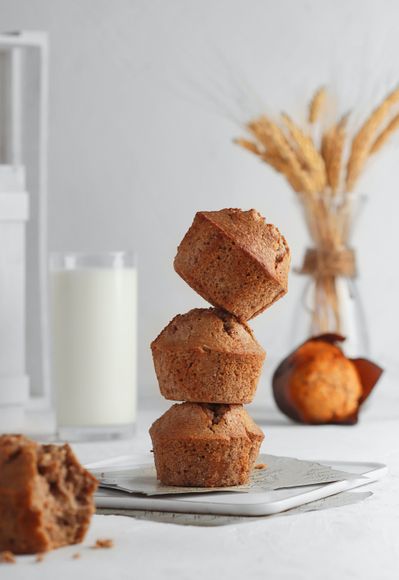
Photo by Slashio Photography on Unsplash
Baked sweet potatoes with coconut oil
Ingredients:
- 3 to 4 medium sweet potatoes, peeled and diced
- 2 tablespoons extra virgin coconut oil, melted or softened
- 1/2 teaspoon pink salt, coarsely ground
Instructions:
Preheat the oven to 200 degrees. Add the sweet potatoes to a large baking tray and add the coconut oil with a tablespoon. Start raining the potatoes in the oil until the potatoes are smeared. Place the container in the oven and bake for 10 minutes. Then pull out the grill and add any spices, such as curry, paprika or turmeric. Mix the potatoes with the spices. Continue baking for a further 15 to 20 minutes or until all the potatoes are softened when they are sautacked with a fork. Turn off the heat and let the potatoes stay in the baking dish for at least 10 minutes to cool before serving warm.
- Antistress and antioxidant effects of virgin coconut oil in vivo. https://www.herbal-organic.com/bg/pubmed/Antistress_and_antioxidant_effects_of_virgin_coconut_oil_in_vivo_25452773
- Angeles-Agdeppa I, Nacis JS, Capanzana MV, Dayrit FM, Tanda KV. Virgin coconut oil is effective in lowering C-reactive protein levels among suspect and probable cases of COVID-19. J Funct Foods. 2021;83:104557. doi:10.1016/j.jff.2021.104557 https://www.ncbi.nlm.nih.gov/labs/pmc/articles/PMC8142857/
- Sands JA, Landin P, Auperin D, Reinhardt A. Enveloped Virus Inactivation by Fatty Acid Derivatives. Antimicrobial Agents and Chemotherapy, 1979; 15(1): 27-31. Sands JA, Auperin LD, Reinhardt A. Enveloped virus inactivation by fatty acid derivatives. Antimicrob Agents Chemother. 1979 Jan;15(1):134-6. doi: 10.1128/AAC.15.1.134. PMID: 218498; PMCID: PMC352613.
- Hierholzer JC, Kabara JJ. IN VITRO EFFECTS OF MONOLAURIN COMPOUNDS ON ENVELOPED RNA AND DNA VIRUSES. J Food Saf. 1982 Mar;4(1):1-12. doi: 10.1111/j.1745-4565.1982.tb00429.x. Epub 2007 Apr 3. PMID: 32336838; PMCID: PMC7166675. https://pubmed.ncbi.nlm.nih.gov/32336838/
- Piret J, Désormeaux A, Bergeron MG. Sodium lauryl sulfate, a microbicide effective against enveloped and nonenveloped viruses. Curr Drug Targets. 2002 Feb;3(1):17-30. doi: 10.2174/1389450023348037. PMID: 11899262. https://pubmed.ncbi.nlm.nih.gov/11899262/
- Anti-inflammatory, analgesic, and antipyretic activities of virgin coconut oil. https://www.herbal-organic.com/bg/pubmed/Anti_inflammatory_analgesic_and_antipyretic_activities_of_virgin_coconut_oil_20645831
- In vitro anti-inflammatory and skin protective properties of Virgin coconut oil. https://www.bioseek.eu/bg/bul/research/pubmed/In_vitro_anti_inflammatory_and_skin_protective_properties_of_Virgin_coconut_oil_30671361
- Antioxidant and anti-inflammatory effects of virgin coconut oil supplementation abrogate acute chemotherapy oxidative nephrotoxicity induced by anticancer drug methotrexate in rats. https://www.bioseek.eu/bg/bul/research/pubmed/Antioxidant_and_anti_inflammatory_effects_of_virgin_coconut_oil_supplementation_abrogate_acute_chemotherapy_oxidative_nephrotoxicity_induced_by_anticancer_drug_methotrexate_in_rats_29224791
- Nephroprotective activity of virgin coconut oil on diclofenac-induced oxidative nephrotoxicity is associated with antioxidant and anti-inflammatory effects in rats https://www.bioseek.eu/bg/bul/research/pubmed/nephroprotective_activity_of_virgin_coconut_oil_on_diclofenac_induced_oxidative_nephrotoxicity_is_associated_with_antioxidant_and_anti_inflammatory_effects_in_rats_32523886
- [COCONUT OIL: NON-ALTERNATIVE DRUG TREATMENT AGAINST ALZHEIMER´S DISEASE]. https://www.herbal-organic.com/bg/pubmed/COCONUT_OIL_NON_ALTERNATIVE_DRUG_TREATMENT_AGAINST_ALZHEIMER_S_DISEASE_26667739
- Antimicrobial activity of coconut oil-in-water emulsion on Staphylococcus epidermidis and Escherichia coli EPEC associated to Candida kefyr https://www.sciencedirect.com/science/article/pii/S2405844018308983
- Antibacterial and immunomodulator activities of virgin coconut oil (VCO) against Staphylococcus aureus. https://www.bioseek.eu/bg/bul/research/pubmed/Antibacterial_and_immunomodulator_activities_of_virgin_coconut_oil_VCO_against_Staphylococcus_aureus_31673647
- Novel antibacterial and emollient effects of coconut and virgin olive oils in adult atopic dermatitis. https://www.herbal-organic.com/bg/pubmed/Novel_antibacterial_and_emollient_effects_of_coconut_and_virgin_olive_oils_in_adult_atopic_dermatitis_19134433
